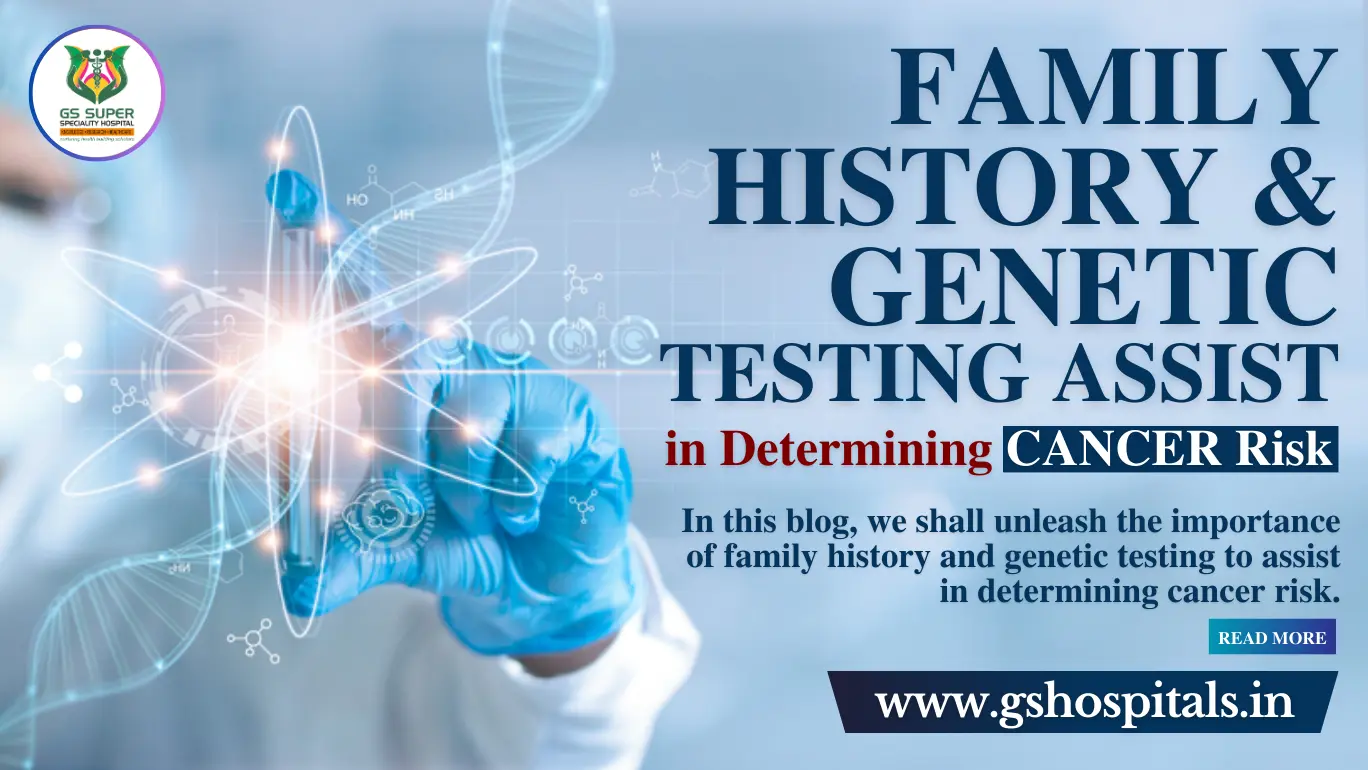Family history and genetic testing play a major role in determining cancer risk. Yes! This may sound quite unusual at times as cancer can happen to anyone at any point in time due to the high prevalence of environmental factors. However, as per research, it has been confirmed that the genetic cause of cancer puts you under the high-risk category.
In this context, GS Cancer Hospital Ghaziabad, the best cancer hospital in Hapur aims to spread awareness amongst their patients about the importance of family history and genetic testing to assist in determining high-risk cancer cases. Apart from providing excellent care and medical services with a team of the best oncologists in Meerut, the hospital also offers preventive cancer care.
In this blog, we shall unleash the importance of family history and genetic testing to assist in determining cancer risk. Let’s begin

Gene mutations play an important role in determining high-risk cases of cancer. These gene mutations are changes in the DNA of the cells that occur during a person’s lifetime.
In simple words, many changes take place in the cellular cycle as every individual grows. Moreover, the majority of the genes are considered familial genes which are derived from either parents or ancestors. One such gene mutation that can be detected through DNA or genetic testing is the cancer gene.
If you have a family history of cancer, undergoing genetic testing can help to confirm inherited cancer genes. If genetic testing reveals a hereditary mutation of the cancer gene, you are at high risk of developing cancer. Positive genetic testing for cancer helps you to work on lifestyle modifications to reduce the risk of cancer in the future allowing you to stay healthy.
Before you plan to get genetic testing done for cancer, it is recommended to speak to your oncologist who will take a detailed case consultation to check for the need for genetic testing.
Detailed case consultation for cancer analysis is a must with your doctor. Knowing about one’s family history helps to lower the risk and prevent cancer. Genetic testing for cancer is an essential tool that helps in detecting high-risk cancer cases.
Accordingly, diagnosis and management of cancer can be done with timely screenings, routine check-ups, and lifestyle modifications at an early age to prevent cancer. A genetic evaluation of cancer can be done through detailed family history, past medical history, and genetic testing.
Many cancers are caused by hereditary mutations which are as follows:
Well, it is important to know that not all cancers are hereditary. Many are also caused due to environmental factors that act as potential triggers for the recurrence of cancer.
Genetic testing for cancer is recommended mainly by your doctor based on his detailed case consultation. Here are some of the following recommendations for genetic testing of cancer:
These are certain factors for genetic testing to determine cancer. However, your oncologist is the best judge who will guide you for the genetic testing for cancer after determining your case history.
Here are the different types of genetic tests for cancer as advised by your doctor:
1. Single Mutation Genetic Testing: This test mainly involves looking out for certain changes in specific areas of a particular gene. It is done for multiple family members to check for high-risk specific cancer cases.
2. Single Gene Testing: This test involves the check on the entire DNA of the specific gene for cancer.
3. Panel Genetic Testing: This involves testing mutations in several genes.
The procedure for genetic testing is as follows:
1. First Step: A detailed case consultation with your doctor.
2. Second Step: Genetic counseling is a must before genetic testing trained genetic counselors will also guide you through the procedure.
These two initial steps are very important before you decide on genetic testing. It will help guide you through the following:
The advantages of knowing family history and genetic testing for cancer are as follows:
The disadvantages of the genetic testing are as follows:
If you have been positive for genetic testing, then your doctor will provide you with the necessary cancer prevention-centric treatment with a personalized approach as per your case.
Genetic testing is done through a collection of blood or saliva which is sent for analysis to look out for changes in genes. It may take days or weeks to complete the analysis procedure to give accurate results.
Genetic testing is considered the safest and most reliable way to determine gene mutations in high-risk cancer cases. The test results signal the presence of mutated genes linked to certain cancers which put you at high risk of developing cancer in the future.
Genetic testing is an affordable test for everyone. The cost of the genetic testing may depend upon the hospital, and medical services you opt for. It is highly recommended to speak to the genetic counselor or hospital staff who will guide you about the potential options for genetic testing.